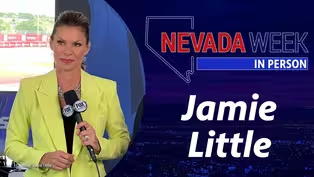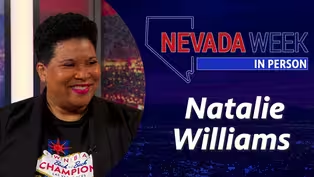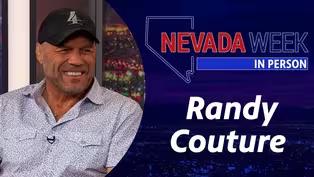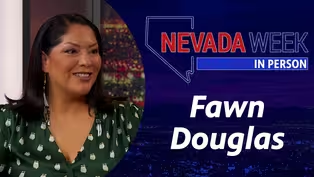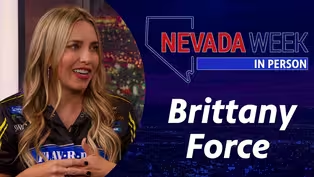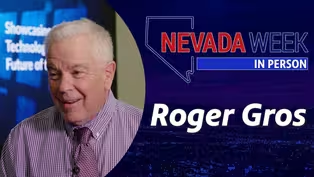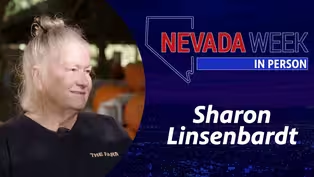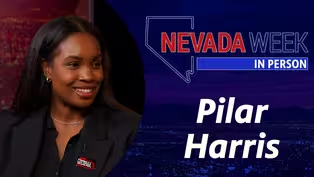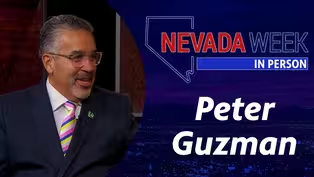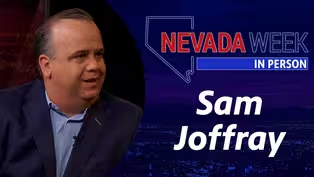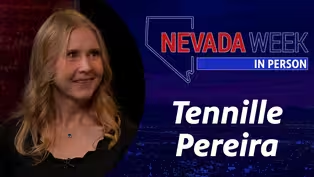
Nevada Week In Person | Troy Heard
Season 1 Episode 89 | 14mVideo has Closed Captions
One-on-one interview with Troy Heard, Artistic Director, Majestic Repertory Theatre
One-on-one interview with Troy Heard, Artistic Director, Majestic Repertory Theatre
Problems playing video? | Closed Captioning Feedback
Problems playing video? | Closed Captioning Feedback
Nevada Week In Person is a local public television program presented by Vegas PBS

Nevada Week In Person | Troy Heard
Season 1 Episode 89 | 14mVideo has Closed Captions
One-on-one interview with Troy Heard, Artistic Director, Majestic Repertory Theatre
Problems playing video? | Closed Captioning Feedback
How to Watch Nevada Week In Person
Nevada Week In Person is available to stream on pbs.org and the free PBS App, available on iPhone, Apple TV, Android TV, Android smartphones, Amazon Fire TV, Amazon Fire Tablet, Roku, Samsung Smart TV, and Vizio.
Providing Support for PBS.org
Learn Moreabout PBS online sponsorshipMore from This Collection
Nevada Week In Person goes beyond the roundtable discussion of Nevada Week with guests for a more casual conversation about their personal passions, new projects and compelling stories that are overlooked in the flurry of the news cycle.
Nevada Week In Person | Jamie Little
Video has Closed Captions
One-on-one interview with Jamie Little, NASCAR Broadcaster (14m)
Nevada Week In Person | Chet Buchanan
Video has Closed Captions
One-on-one interview with Chet Buchanan,Host & Creator, 98.5 KLUC’s The Chet Buchanan Show (14m)
Nevada Week In Person | Natalie Williams
Video has Closed Captions
One-on-one interview with Natalie Williams, General Manager, Las Vegas Aces (14m)
Nevada Week In Person | Randy Couture
Video has Closed Captions
One-on-one interview with Randy Couture, UFC Hall of Famer & U.S. Army Veteran (14m)
Nevada Week In Person | Fawn Douglas
Video has Closed Captions
One-on-one interview with Fawn Douglas, Artist and Activist, Nuwu Art (14m)
Nevada Week In Person | Brittany Force
Video has Closed Captions
One-on-one interview with Brittany Force, World Champion Drag Racer (14m)
Nevada Week In Person | Roger Gros
Video has Closed Captions
One-on-one interview with Roger Gros, Publisher, Global Gaming Business Magazine (14m)
Video has Closed Captions
One-on-one interview with Sharon Linsenbardt, Owner, Las Vegas Farm and Barn Buddies Rescu (14m)
Nevada Week In Person | Pilar Harris
Video has Closed Captions
One-on-one interview with Pilar Harris (14m)
Nevada Week In Person | Peter Guzman
Video has Closed Captions
One-on-one interview with Latin Chamber of Commerce Nevada President & CEO Peter Guzman (14m)
Nevada Week In Person | Sam Joffray
Video has Closed Captions
One-on-one interview with Sam Joffray, President & CEO, Las Vegas Super Bowl LVII Host Com (14m)
Nevada Week In Person | Tennille Pereira
Video has Closed Captions
One-on-one interview with Tennille Pereira, Director, Vegas Strong Resiliency Center (14m)
Providing Support for PBS.org
Learn Moreabout PBS online sponsorshipA champion for a local theater with a penchant for horror, Director, Writer, and Producer Troy Heard is our guest this week on Nevada Week In Person.
♪♪♪ Support for Nevada Week In Person is provided by Senator William H. Hernstadt.
-Welcome to Nevada Week In Person.
I'm Amber Renee Dixon joining you from Majestic Repertory Theatre in Downtown Las Vegas where right now you can see Scream'd: An Unauthorized Musical Parody, based off Scream, the '90s slasher horror film franchise.
Its director is also the artistic director of Majestic Repertory and our guest.
Troy Heard, thank you for joining Nevada Week In Person.
(Troy Heard) Thanks for having me, Amber.
-Before we get into your background, let's talk about Scream'd, which you are directing, but you also co-wrote with Brandon Scott Grayson.
-Mm-hmm.
-How did Scream'd come to be?
-Okay.
Well, last year, we worked out a show during the pandemic called The Craft: An Unauthorized Musical Parody.
It's-- The Craft is based on the '90s film about teen witches.
And I figured, how can we create this really cool, immersive rock'n'roll concert party environment that completely blows the idea of musical comedy out of the water?
It's a place where people who don't know theater, who, you know, who've never maybe set foot in a theater can come in and have a great time and get an exposure to it.
Long-winded answer.
We did that.
It was a huge hit.
The Craft had a playlist that had Nine Inch Nails, Siouxsie and the Banshees, different bands of the '90s, played by a live band on stage.
And it was a huge runaway hit.
Like we did it here for a couple of months, and we took it to Kansas City and killed.
And that's been one of our biggest requested shows to bring back.
And I'm not one to go back over old territory, and I was thinking, you know, what's the other thing?
What's the other capstone horror thing of the '90s that people still love?
And Scream 7 is coming out next year.
I mean, this thing, Scream, has been around since I was in college.
So that was the next obvious choice.
-What's the response been?
-Oh, my gosh.
Here's the story: So I had coffee with my choreographer Noah Rivera yesterday, and he reminded me that we had a really tough year.
Like, a lot of theaters around the country are struggling right now, coming back from pandemic.
And I said, "If Scream'd doesn't make it, we're shutting the doors."
Scream'd is now planning an American tour next year.
That's been the response to it.
It has become a viral sensation online, millions of views.
People around the world are clamoring for this little show in this tiny little dinky storefront on Main Street to go to their cities, because it is such a good time.
The response, in a word, phenomenal.
-That thought of having to shut down this theater that you've been at since it opened in 2016, what do you think when that possibility creeps into your mind?
-Well, it's been a reality.
It's been a reality a lot of theaters, a lot of arts organizations--not just in Las Vegas, but around the country--are facing right now.
And I took a gamble, because it's Las Vegas, on something that I love.
I love rock music, I love the '90s, I love horror, and I love a good, good fun time.
And I combined all that into something that has now turned Majestic around and is sending audiences out with not just smiles, but fist pumps in the air.
And people are coming back time and time again.
They're coming back in costume and bringing friends.
It's really a party in this room.
It's really, really cool.
-Your penchant for horror, which I mentioned in the intro, where does that stem from?
-Oh, gosh, my mom.
I mean, my mom raised me on-- well, it wasn't just horror.
I mean, she took me to the theater.
She took me to classic movies.
She gave me a library card as young as I could remember.
Like, we were always going to cultural events.
She wanted to raise me as a well-rounded person.
Horror came by way of dark comedy.
My mom's philosophy was life is really, really hard sometimes.
It's really, really tough.
You can either give into it and fall back and just take it all in and dwell in the darkness, or you can laugh.
That's where the dark comedy came from.
The horror kind of came in the same direction too.
Horror and comedy are very much related.
It's taking a situation, twisting it, and getting a reaction, whether it's a laugh or a scream.
-Huh.
-You're getting provoked.
And there is an interrelationship between the two.
-Now, you mentioned in an article from, I believe, Desert Companion that was about 10 years ago-- -Wow!
- --that she had recently passed.
-Yes.
-And you mentioned that in the year following her death, there was a death featured in almost every one of your plays.
Has that continued?
How has her passing impacted your work?
-Oh, it's-- I think, you know, whenever you're jarred by a very personal traumatic situation, you see it reflected everywhere you turn.
I mean, you hear people say, Oh, I thought I saw my husband.
I thought I saw my wife there.
You know, whoever is gone.
I heard the voice.
You know, as a director, I live-- a lot of my work is interpretation and analysis.
It's a lot of psychology, it's a lot of breaking down texts, it's a lot of analyzing people, and it just seemed coincidentally that a lot of the works I was contracted to direct after her death were very thematic of death.
Death was the theme that popped all the way through.
There was Hamlet.
There was Death of a Salesman.
And I mean, two of the biggest tragedies in the canon I was dealing with.
You know, it's we're all gonna die.
Happy Halloween!
[laughter] -Death and taxes, but how do we manage it?
As Americans, we tend to demonize it.
We either push it away, hide it under the covers, or we demonize it.
But you look at other cultures, and they've found ways of embracing it, of facing it full-front, head-on.
Here we go.
How will we go on this journey?
And we either embrace the journey or we run away from it.
I think those are the two options.
And I choose to embrace it.
We're on this journey.
You know, going back to horror, horror movies are a huge, huge genre.
I mean, when I was a kid, I was carrying around my Fangoria magazine.
I was the weirdo outcast.
-Which Scream'd was featured in, Fangoria.
-Yes.
Scream'd got a review in Fangoria.
My life goal has been achieved.
But you know, back then it was the outcast.
It was the oddity.
I was the weirdo with the Fango.
But now I think we're sort of climbing towards a sense of embracing it and facing it all, you know, head-on.
But it's a way of facing death safely.
I mean, if we're going on this roller coaster ride.
Why do we go on a roller coaster ride?
For the thrills, for the danger, for the excitement, because you know three minutes later, that bar is gonna get up and you're gonna step out and go get some popcorn.
You survived.
-You mentioned cultures that take on death in different ways.
Is there one that sticks out?
-Well, living in Nevada, I mean, Mexico's Dia de los Muertos, obviously, is huge.
And I'm glad that Las Vegas embraces it as well.
It's really, really cool.
And, you know, you've got movies like-- Disney making a movie like Coco-- -Right?
- --that teaches children this is what this is.
I think-- I do-- my background is in theater education.
I work with a lot of children.
And I see parents are like, No, we can't do that.
We need to protect them.
We've got to hide them from this.
But sometimes-- I mean, I was raised knowing that it's there.
You know, how do we-- how do we deal with it?
-Did your mother encourage you to get into theater?
How did you get into theater?
-No, she didn't.
-No?
-No.
She wanted stability.
She's like, You need stability.
You need a career or you need security.
That's why my undergrad is in theater education.
So that made her happy.
But I've worked professionally in theater my entire life.
-Starting?
-In high school.
-In high school?
-In high school.
So I went to a small Catholic school in Columbus, Georgia.
And it was football, football, football.
No funding for the arts.
You know, the more times change, the more they stay the same on that regard.
But sophomore year, we got a new principal.
And by that time, I had a video camera.
It was the '90s.
I'm a Gen X kid.
I was making little horror movies in my backyard, doing weird art installations.
This new principal, Dr. Finchett, comes in and he says, You're that weird art kid.
We don't have a theater department.
Why don't you do theater?
Why don't you direct the school plays?
And I-- that was anathema to me.
My idea of theater was like these grand opera houses with these old people with white hair like Q-tips in the audience watching boring, dull Shakespeare.
He said, No, no, no.
I want you to do something.
I'm going to buy you a ticket to this show.
It's running at this local theater.
It's called Sweeney Todd.
It's a slasher film on stage.
I'm like, Okay, you got me with the slasher film, but I don't know about theater.
I'll do it.
You'll buy the ticket?
I'll do it.
I went that weekend, sat in the beautiful Springer Opera House, saw a production of Sweeney Todd with that 30-piece orchestra, with 35 odd people on stage singing this powerful, impactful music right there just yards in front of me, just sharing the space with all these people that normally I'd be in the movie with, watching a movie with.
But here we were watching this thing, and it was so impactful, so powerful.
I never went back.
Plus, you didn't need expensive editing equipment.
You get an actor and audience member, you've got an experience.
-How did you end up in Las Vegas?
-I graduated-- I got my master's in directing from Savannah College of Art and Design.
And I was on my way out to LA for an internship, and my truck broke down.
And I wound up, roundabout way, working with Cirque du Soleil with their show KA.
They had developed a brand new program called the Gatekeeper program where, instead of having ushers, they had improvisational actors do usher duties, but they had these characters they were playing.
So they would create these scenes as they were bringing you to your seats and tearing your ticket or whatever.
-You were doing some acting?
-Yeah.
A little bit.
Well, what turned out to be-- this is a whole other, you know, episode.
[laughter] -It was immersive theater, and it was something that I've always been interested in.
You know, what is this interactive type of theater that gets you out of that Grand Opera House, that makes what we call "theater accessible" to wider audiences, to people who may have been like me, reluctant to go into something that seemed very prohibited, very exclusionary.
So it was a form of theater I really enjoyed, form of entertainment I enjoyed.
And this opportunity with Cirque was fantastic.
-How have you gotten people back in the theater post-COVID, especially with immersive theater when people are close and interacting?
-Yeah.
It's trust.
It's trust, but I think Majestic, we've been really, really cognizant of it.
We never really shut down.
A lot of other companies did shut down, but we were fortunate to have a friend of ours who provided us with testing equipment.
We were basically potted throughout the entire experience, where we had our group who didn't break out.
We started off doing like internet-based shows.
We were doing stuff on Instagram Stories, and then we started doing drive-thru shows and drive-up shows where people would drive up the back alley.
We'd do something for them, give them a T-shirt or whatever, and then the gates would open and they'd see a burlesque dancer or they'd see a clown act or, you know, anything by these performers who were out of work at the time.
And then we did a drive-in show where we literally lifted the back of the theater-- there's a garage door.
We would drive a car in, and then a scene would happen around it, and then you drive back out.
-Wow!
-Didn't make money.
I mean, there's no way with the, with the turnaround.
But it was still a way of keeping active.
-So by not leaving the scene, you continued to have people engaged and then come back when they could?
-Yep.
And it was fun.
It was experimenting.
-Before we run out of time, one more reference to that article from 10 years ago.
In it you said, quote, There's a little bit of frustration in that this is the only city of this size that I've lived in that doesn't have a theater community.
But it's the yin and the yang.
You've got talented artists here who are creating great work.
They just need to find an audience.
So 10 years later, does Las Vegas have a theater community?
-Vegas has a very interesting theater community.
It still has an ebb and flow.
It's a lot stronger than it was then.
I think the audience support is a lot stronger.
I think media support is a lot stronger.
Where Vegas lacks-- and I know a couple of other arts leaders in the city who will agree with me on this, because we have these conversations.
Where Vegas lacks is in true corporate philanthropy for smaller organizations that aren't necessarily gigantic performing arts centers, like The Smith Center.
You know, you've got myself, you got Vegas Theatre Company, you have A Public Fit, and we're all rallying, trying to get this attention from Caesars Foundation, you know, from any sort of-- we've got billions of dollars going through here, but they're not funneling it down to the real authentic local arts.
I mean, Bernard Gaddis with Contemporary Dance could certainly use some help too.
Like, we're all struggling on that regard.
-Hopefully some of those corporations are listening.
Troy Heard of Majestic Repertory Theatre, thank you for joining Nevada Week In Person.
-Thank you.
-And for more interviews like this, go to vegaspbs.org/nevadaweek.

- News and Public Affairs

Top journalists deliver compelling original analysis of the hour's headlines.

- News and Public Affairs

FRONTLINE is investigative journalism that questions, explains and changes our world.












Support for PBS provided by:
Nevada Week In Person is a local public television program presented by Vegas PBS
